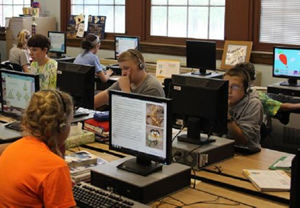NEF Initiates 2 Programs To Improve Digital Skills of U.S. Students and Workers
 The National
Education Foundation (NEF) has introduced two
programs designed to enhance the digital literacy skills of
American
students and the job skills of the United States workforce.
The National
Education Foundation (NEF) has introduced two
programs designed to enhance the digital literacy skills of
American
students and the job skills of the United States workforce.
NEF, a nonprofit that focuses on
enhancing academic and job
skills for disadvantaged students and adults, has introduced the
National
Digital Literacy initiative and the Adopt-a-School national initiative,
both in
partnership with the State
University of New York (SUNY).
The $100-million digital literacy initiative will
make
available the Web-based Internet & Computing Core Curriculum (IC3)
to all
participating schools. The course focuses on basic computer, computer
application and Internet skills, all in line with standards that
accompany the
federal No Child Left Behind program. Any student who successfully
completes
the course will receive a certificate from SUNY.
NEF plans to provide the online course, prepared by
SUNY,
immediately to school districts that apply to be part of the program and
hopes
to roll it out to every school in the United States by 2020.
"We believe our students need digital literacy skills
to
compete in the global economy," said NEF Chairman Appu Kuttan. "Our
national
initiative is aimed at preparing our students better for college and the
21st-century
workforce."
The second initiative, the Adopt-a-School program,
will set up
STEM+ Cyber Learning Academies in financially disadvantaged schools in
the
United States. In this case, STEM+ refers to science, technology,
engineering,
math, English, social studies, digital literacy, IT, business and
management.
The academies will help the students at participating
schools
develop the skills they will need to compete in the 21st century. At
the same time, local business will have access to more than 3,000
professional
development courses and mentoring that they can use to train their
staffs.
Participating businesses will receive 50-percent
grants to pay
for the courses. Meanwhile, the fees that will be paid will help fund
the
academies for the students in the schools.
"America is ranked 25th out of 35
countries in math
and science," Kuttan said. "Our initiative is aimed at preparing our
students
and employees better for STEM-related jobs and college."
School districts and employers interested in applying
to
participate in either initiative can go to cyberlearning.org for more
information.
About the Author
Michael Hart is a Los Angeles-based freelance writer and the former executive editor of THE Journal.